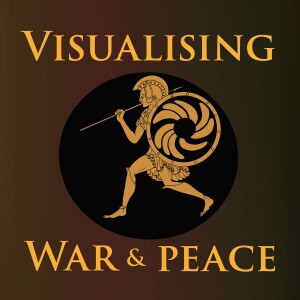
In this week's episode, Alice and Nicolas talk to producer and director Sam Taplin about representations of war in TV documentaries. Sam has worked in a variety of genres, from factual programmes to drama documentaries. He has credits with Channel 4, Channel 5, Netflix, the Discovery Channel, National Geographic and PBS, among others, and has particularly specialised in documentaries on the Second World War. He talks about the pragmatics of documentary making, what kinds of audiences different production companies are trying to engage, and what difference all of that makes to the war stories they tell.
In the podcast, we chat about why some wars lend themselves more to documentary making than others: the lack of visuals and the challenges of reconstructing ancient and medieval battle scenes make them less popular with directors, for example, while the attritional grind of WW1 and the lack of 'action' in the Cold War tend to put both producers and audiences off. The Second World War, by contrast, lends itself more to engaging storytelling, with a mix of human endeavour and technological innovation, an easily identifiable 'baddie', and a succession of dramas on land, sea and air. This gets us talking about the 'narrative arcs' which documentaries often try to create around historical events, particularly when channels are trying to keep audiences beyond the next ad break. We discuss how selective the storytelling sometimes is, and how the desire to narrate crisis and climax can distort historical reality. Sam reflects on the tension between entertainment and education, and we talk about the influence which historical documentaries can have in cementing ideas about what different wars were like, what triggered or prolonged them, and how they were resolved. We also chat about the limits of representation: for example, how much of the horrors of war are production companies or audiences willing to visualise?
Among other questions, we asked Sam:
- how popular are war documentaries with TV production companies and audiences, and which wars are people most interested in?
- who/what decides which aspects of a conflict a documentary should focus on? (audience expectations, the need to 'entertain', the need for a new 'angle', academic input, etc?)
- what aspects of conflict are less often represented, and why?
- how have war documentaries changed over time, and what trends might we expect in future?
- what impact do war documentaries have today on our habits of visualising war?
We hope you enjoy the episode!
*Please note: this episode was recorded in spring 2021, before the Taliban took control of Afghanistan. Some references to Afghanistan are therefore out of date.
For a version of our podcast with close captions, please use this link. For more information about individuals and their projects, access to resources and more, please have a look on the University of St Andrews Visualising War website.
Music composed by Jonathan Young
Sound mixing by Zofia Guertin
More Episodes
 2021-12-15
2021-12-15
 2021-11-24
2021-11-24
 2021-11-17
2021-11-17
 2021-09-01
2021-09-01
 2021-08-28
2021-08-28
Create your
podcast in
minutes
- Full-featured podcast site
- Unlimited storage and bandwidth
- Comprehensive podcast stats
- Distribute to Apple Podcasts, Spotify, and more
- Make money with your podcast
It is Free
- Privacy Policy
- Cookie Policy
- Terms of Use
- Consent Preferences
- Copyright © 2015-2024 Podbean.com





